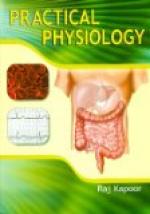Experiment 136. To paralyze a nerve temporarily. Throw one arm over the sharp edge of a chair-back, bringing the inner edge of the biceps directly over the edge of the chair. Press deep and hard for a few minutes. The deep pressure on the nerve of the arm will put the arm “asleep,” causing numbness and tingling. The leg and foot often “get asleep” by deep pressure on the nerves of the thigh.
Experiment 137. Press the ulnar nerve
at the elbow, the prickling
sensation is referred to the skin on the
ulnar side of the hand.
Experiment 138. Dip the elbow in ice-cold water; at first one feels the sensation of cold, owing to the effect on the cutaneous nerve-endings. Afterwards, when the trunk of the ulnar nerve is affected, pain is felt in the skin of the ulnar side of the hand, where the nerve terminates.
Chapter XI.
The Special Senses.
308. The Special Senses. In man certain special organs are set apart the particular duty of which is to give information of the nature of the relations which he sustains to the great world of things, and of which he is but a mere speck. The special senses are the avenues by which we obtain this information as to our bodily condition, the world around us, and the manner in which it affects us.
Animals high in the scale are affected in so many different ways, and by so many agencies, that a subdivision of labor becomes necessary that the sense avenues may be rigidly guarded. One person alone may be a sufficient watch on the deck of a sloop, but an ocean steamer needs a score or more on guard, each with his special duty and at his own post. Or the senses are like a series of disciplined picket-guards, along the outposts of the mind, to take note of events, and to report to headquarters any information which may be within the range of their duty.
Thus it is that we are provided with a number of special senses, by means of which information is supplied regarding outward forces and objects. These are touch, taste, smell, seeing, and hearing, to which may be added the muscular sense and a sense of temperature.
309. General Sensations. The body, as we have learned, is made up of a great number of complicated organs, each doing its own part of the general work required for the life and vigor of the human organism. These organs should all work in harmony for the good of the whole. We must have some means of knowing whether this harmony is maintained, and of receiving timely warning if any organ fails to do its particular duty.
Such information is supplied by the common or general sensations. Thus we have a feeling of hunger or thirst indicating the need of food, and a feeling of discomfort when imperfectly clad, informing us of the need of more clothing.




